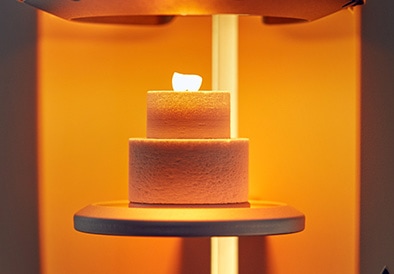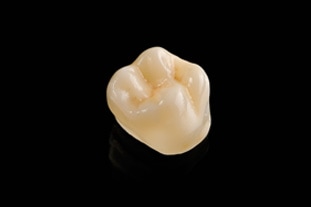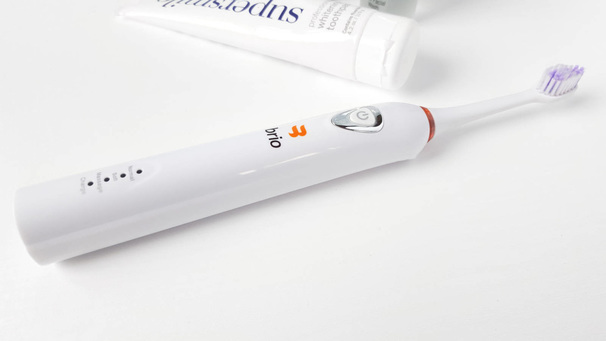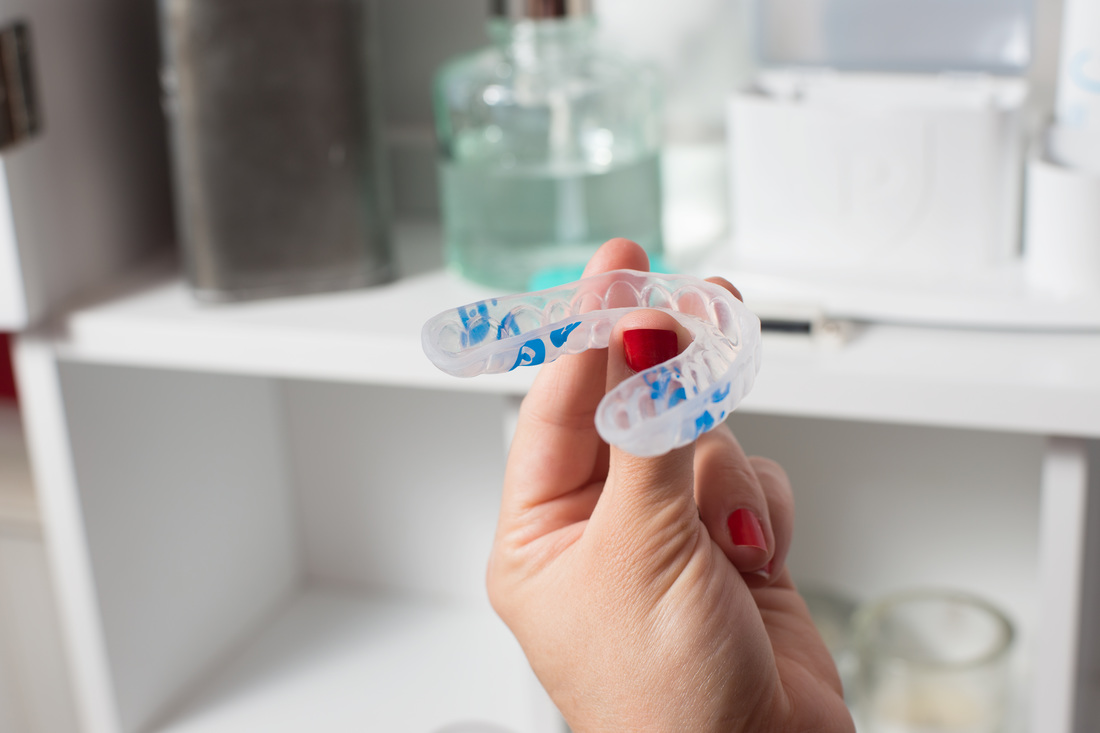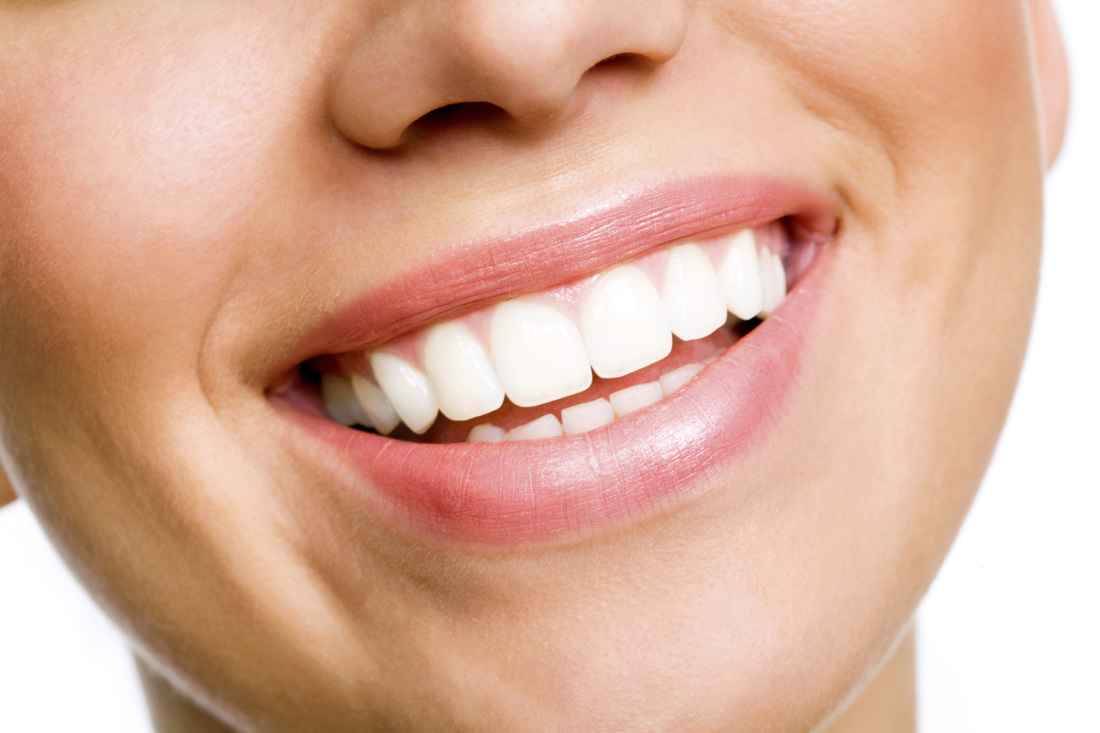|
Let's say you have a dental emergency. Do you go to the hospital or to Pearl Dental Care? Where you go for treatment will depend on the type of emergency and where the problem area is. Accidents such as jaw fractures, major lacerations to the face, trouble breathing or swallowing, or jaw dislocation require immediate attention at a hospital emergency department. For dental emergencies involving broken teeth, missing teeth, abscess, oral wounds, or other emergencies that are not considered life-threatening you should see your dentist for immediate care.
There are several situations the American Dental Association recommends patients become familiar with.
All-new technology at Pearl Dental Care is the CEREC SpeedFire oven. Why are we so excited about this machine? It allows for the fabrication of super strong Zirconia crowns in one office visit. Zirconia crowns are the strongest tooth colored all-ceramic crowns on the market. Previously, these types of crowns could only be made by an outside dental lab. After scanning your tooth with the 3D scanner, the crown is milled with our CAD/CAM machine. Zirconia needs a final sintering so the crown is then placed in the SpeedFire oven for 10-15 minutes. Here are some of the advantages of single visit Zirconia restorations-
For more information visit our page on CEREC
Bicycling Magazine recently published an article listing 20 easy ways to help your heart. Some of the recommendations include eating calcium rich foods, filling up on antioxidants, and treating high blood pressure. Number 8 on the list is "Go to the dentist."
The tip references a Taiwanese research study which showed that people who had their teeth cleaned twice per year for the past 2 years had a 24% lower risk of heart attack and a 13% lower risk of stroke compared with people who did not have a cleaning. Professional cleanings reduce inflammation and bacteria in the mouth, which lowers inflammation in other areas of the body such as the blood vessels. According to a recent article in The Wall Street Journal, genetics may increase your chances of getting cavities and even inheriting a sweet tooth. Some patients with average to poor oral hygiene rarely if ever get cavities. Other patients with diligent home care who floss and brush regularly are often told by their dentist that they have cavities. Dr. Michael Glick, a professor at the School of Dental Medicine at the University at Buffalo and editor in chief of the Journal of the American Dental Association, explains how genetics may increase your chances of getting cavities in baby teeth by up to 64%. Genetics affect the way tooth enamel is formed. Different variants of enamel may be better or worse at resisting acid erosion.
Dr. Glick says "(i)t's hard to separate a high-sugar diet that will predispose one to develop cavities from a genetic predisposition." Community trends in cavities are usually a result of dietary habits but current research is nevertheless showing a genetic component. Even if someone is genetically susceptible to cavities, the fact remains that you need sugar in your diet to get a cavity. You cannot get a cavity without sugar. Avoiding sugar products that cling to teeth is the best preventative measure you can take. If you think you are more susceptible to cavities make sure you follow hygiene recommendations- brush twice a day, floss regularly, rinse with mouth wash, and see a dentist at least twice a year. "Don’t sweat the genetics, he says. “See your dentist often, brush regularly and get your cavities filled quickly,” whether your parents had lots of cavities or not." You and your dentist have a range of options for relieving dental pain. It's most important to determine the cause of the pain and if any treatment is necessary. This blog post will discuss medications that are available for mitigating dental pain. When choosing a pain medication you might consider:
OTC Drugs OTC (over the counter) drugs are medications that you can buy at a pharmacy without a prescription. The two general types of OTC pain relievers are non-steroidal anti-inflammatory drugs (NSAIDs) and acetaminophen (Tylenol). Examples of NSAIDs include ibuprofen (Advil of Motrin), naproxen (Aleve or Naprosyn), and aspirin. Some of these drugs have different maximum dosages and indications. Research has shown that NSAIDs are just as effective as narcotics for relieving most dental pain. People with asthma, kidney disease, and gastric ulcers should not use NSAIDs. In addition, patients on blood thinners should not use NSAIDs. For these patients Tylenol is a better choice. Prescription Drugs Prescription drugs include higher dosage NSAIDs and narcotics. For nearly all patients, a higher dosage NSAID works just as well if not better than narcotics and has less side effects. Narcotics are often combined with an OTC medication. For instance Vicodin is a combination of hydrocodone and acetaminophen. Narcotics can make people sleepy and there is a risk for addiction, so NSAIDs or Tylenol are usually a better initial choice. . Taking Prescription Drugs Safely Take your medication exactly as directed. Remember, it is for your use only. It can be harmful or fatal when used by someone else. Make sure you tell your dentist if you are taking other medications (even OTC medications) because some combinations can be dangerous. Talking To Your Dentist About Pain Medication When you talk to your dentist about pain relief make sure you tell him or her about your past history with pain, past use of OTC and prescription pain medications, and your full medical history. Are there certain drugs that made you feel poorly? Are there certain drugs you know you can't take? Be sure to ask questions about when to take your pain medication (for example, whether you should take the medication after a meal). If you find that the medication is not improving your pain, call your dentist. Since there are so many pain medications available today, he or she will be able to recommend a different option. In the past several months there has been a lot of chatter about the benefits of flossing. An Associated Press report stated that flossing does not add any benefit over brushing. Many people are confused and skeptical about what is being reported. The main point from the Associated Press report is that since there is no randomized control trial (RCT) to prove the benefits of flossing, then we shouldn't floss. RCT's are the gold standard in scientific study. However, it's unethical to enroll subjects in an exerpiment where half of the subjects are instructed not to floss- for potentially years.
The truth is that dentists every day see the benefits of flossing. In fact, when performing crown, bridge, and filling procedures, we almost always use floss to check contacts and clean under the gums. We do this because flossing works. Floss cleans debris and bacteria where a toothbrush can't reach. There are other interdental cleaning tools on the market such as proxy brushes and wood picks. These work similarly as floss and can often be used in place of floss. An RCT isn't necessary to prove the benefits of flossing because the benefits are obvious! For the people who hate to floss and finally thought they could no longer feel guilty about not flossing, we're sorry! We really love the WaterPik. It's fun to use and a great flossing alternative. A recent FOX News Health article discussed 10 holiday foods and drinks your dentist might not be happy about. We all tend to let loose around the holidays and recklessly consume cakes, candies, cookies, beverages and more. Here are 10 holiday season staples that may make you think twice before indulging.
After consuming sugary items it's best to brush and floss. Waiting half an hour or so is a good way for the body to naturally neutralize acids and cleanse the teeth. We also recommend xylitol chewing gum and plain water. In a recent article published by The Washington Post the relationship between gum disease and various others diseases was discussed. "Open wide. There’s a host of researchers peering inside your mouth, and you may be surprised at what they hope to find. They’re looking for a connection between gum disease and illnesses such as breast cancer and even dementia."
Is gum disease related to diabetes, pancreatic cancer, and heart disease? There certainly seems to be more and more evidence of a relationship. It could be possible that one disease exacerbates another or gum disease could be a symptom of other diseases. "In the meantime, extra dental care for those with gum disease and certain at-risk conditions has become common, pragmatic practice." Gum disease, also known as Periodontitis, is an inflammatory condition in the mouth. Signs of gum disease include bleeding gums, swollen gums, bad breath, and loose teeth. Left untreated, gum disease can result in tooth loss and can increase the risk and severity of other diseases. "While not definitive, the links between gum disease and diabetes, at-risk pregnancy, heart disease and stroke have been so consistent that some insurers offer extra preventive periodontal care at little or no cost to people with those conditions." For more information on periodontal therapy visit us here. Oral cancer, most commonly squamous cell carcinoma, is associated with a history of smoking and alcohol use. According to a new study report by Oncology Nurse Advisor, poor oral health is associated with oropharyngeal squamous cell carcinoma. As opposed to oral squamous cell carcinoma, oropharyngeal (involving the throat) is often associated with HPV. The new study was recently published in the journal Cancer.
The results of the study showed that routine dental examinations were associated with a 48% reduced risk of HPV-negative oropharyngeal squamous cell carcinoma and a 45% reduced risk of HPV-positive oropharyngeal squamous cell carcinoma. The study researchers found that the prevalence of periodontal disease increased the risk of HPV-negative oropharyngeal squamous cell carcinoma by 70% and HPV-positive disease by 45%. Further investigation is necessary, but periodontal disease is increasingly found to be involved with many systemic diseases. Dental sealants are one of the best ways to lower the chances of getting a cavity. Sealants are recommended for children as soon as their teeth are fully erupted into the mouth. Sealants protect the teeth from developing occlusal cavities. Occlusal means the biting surface of the tooth. By penetrating the pits and fissures (grooves) of the teeth, the sealant material is a physical barrier against cavities because it prevents food and bacteria from getting trapped. Sealants can also help arrest the early stages of an existing cavity.
The evidence shows that dental sealants are safe and very effective at protecting teeth from occlusal decay in both baby teeth and adult teeth. Many people believe that getting your wisdom teeth removed is a necessary rite of passage. Is this true and why do so many people have their wisdom teeth removed?
Wisdom teeth (third molars) usually erupt into the mouth between the ages of 17 and 21. They are called wisdom teeth because they come through at a more mature age. Some people have enough room in their jaws for the wisdom teeth to erupt normally and function properly like their other teeth. However, if there isn't enough space wisdom teeth can lead to problems. If the wisdom teeth are impacted it means they are trapped under the gums or in the bone. If this is the case the following can happen:
Every patient is different, but in general, wisdom teeth may need to be removed if there is evidence of the following changes in the mouth:
Just because 1 wisdom tooth is causing a problem does not mean that all of them need to be removed. Regular dental visits allow your dentist to evaluate your wisdom teeth and overall oral health. Research from Taiwan has showed that frequent and regular dental scalings (cleanings) are associated with a decreased risk of infection after total knee arthroplasty (TKA). The data analysis showed that patients who received dental scaling had a 20% lower risk for infection than patients who did not get scaling. The more frequently patients got scaling the lower their risk for infection.
Source: http://www.ada.org/en/science-research/science-in-the-news/frequent-dental-scaling-was-associated-with-decreased-risk-of-periprosthetic-joint-infection Brushing before bed is probably the most important time to brush your teeth. Brushing after daily meals is also recommended. But what happens after daytime snacks when you can't brush? Bacteria in the mouth start consuming the sugar we eat and the acid from our soft drinks and coffee wear our teeth. Utilizing our body's natural defense, saliva, against oral challenges can be magnified by chewing gum.
Chewing sugar-free gum promotes salivary flow, which helps buffer acids, clean the teeth, and potentially even combat some bacteria. Chewing gum containing xylitol is preferred. Chewing gum not only loosens up food in your teeth but it gets the salivary glands working. Chewing the recommended dose of xylitol gum for about 10-20 minutes is a great way to protect your mouth when floss and a toothbrush aren't handy. Remember, gum is a complement to your normal dental routine, not a substitute. Myth 1: Sugar is the only thing that causes cavities
In fact the acid produced by bacteria cause cavities. The bacteria digest the sugar we eat. Any carb you eat can contribute to bacteria produced acid such as sugar from fruit, rice, and bread. Fact 1: Acid causes tooth decay Consuming acidic foods and drinks can erode the enamel (outer covering of teeth) similar to the way bacterial acid wears the teeth. Myth 2: Kids get more cavities than adults While there has been a decrease in childhood cavities since the public health initiative to put fluoride in drinking water, there has been an increase in cavities in the elderly due to medications that dry the mouth. One of saliva’s main benefits is to protect the teeth from acid. Myth 3: Putting aspirin next to a tooth will help a toothache Aspirin must get into the bloodstream to exert its effects. The acidity of the aspirin tablet could cause an ulcer on your gums. Myth 4: You will know when you have a cavity When the cavity gets so big it reaches the pulp you will probably have intense pain. However, it’s best to get a cavity treated when it is small and before the pain starts so that as much of your natural tooth as possible is still healthy. Fact 2: Once a tooth is treated the decay stops Before your dentist puts in a filling he makes sure all of the cavity and diseased tooth is removed so that it is clean before the filling. However, after a filling is placed a new cavity can initiate if diet and home care aren't improved. Fact 3: Cavities are most likely between your teeth Bacteria love to hide where the toothbrush can’t reach, especially between your teeth. Use floss, mouthwash, and interdental brushes to get the difficult spots between teeth. Myth 5: Cavities are the only reason for root canals Injury to the tooth can also require a root canal Fact 4: You have to brush and floss to prevent cavities Definitely! Without excellent home care you won’t be able to remove food, plaque, and bacteria. If you don’t like to floss try an interdental brush or a toothpick. A new page on our website which will be periodically updated is "Dr. Pearl's Recommended Products." These products include oral hygiene aids, gums, and more which Dr. Pearl personally uses in his everyday life and recommends. The list is not all-inclusive and by its nature a work in progress. New products will be added and older less desirable products will be removed. Enjoy!
Pearl Dental Care is now offering a new treatment option for periodontal disease called Perio Protect. Periodontal disease is a bacterial infection, which combined with an autoimmune response, destroys the tissues that hold the teeth in the mouth. Perio Protect uses custom mouth trays to apply medication below the gums. Proper use of Perio Protect and excellent home care allow the body’s natural immune system to more effectively fight the bacteria.
Patients find that the Perio Protect trays are very comfortable. When combined with scaling and root planing and improved oral hygiene, patients can see a dramatic improvement in oral health. Studies have shown that with improved periodontal disease comes a reduction in total body inflammation. Improvements in periodontal disease have been associated with improvements in diabetes, cardiovascular disease, and other conditions. Perio Protect is not for everyone. For advanced cases of periodontal disease, the LANAP protocol is the recommended treatment option. All of your options can be reviewed at your next check-up at Pearl Dental Care. Pearl Dental Care had a girl's night out at Plant NIte! We have fun together inside and outside of the office! Shown here (L to R): Jennifer, Jennifer, Sharon, Courtney, Esther, and Dawn.
According to an article published by WTNH, CT residents are the second best in the country at visiting the dentist.
We all know that we are supposed to floss everyday. But how many of us actually do? The first nationally representative analysis says that about 30% of the population flosses every day. About 32% of people say they never floss and about 37% of people report less than daily flossing.
Flossing removes food and plaque between teeth that toothbrushes cannot get to. Without removal, these entrapments harbor bacteria that cause inflammation. Interestingly, the study found that males (39%) were more likely to report never flossing than females (27%). Younger people tend to floss more than older people. Source: US News & World Report Reader's Digest recently published an article entitled "7 Signs of Disease Your Teeth Can reveal." The article describes how dentists are trained to detect more than just cavities. Disease in the mouth can relate to disease in the rest of the body and vice versa. Systemic conditions that have manifestations in the mouth include type 2 diabetes, acid reflux, stress, osteoporosis, autoimmune disease, eating disorders, celiac disease, and hormonal changes. If you notice any unusual changes in your mouth be sure to let your dentist know. If your dentist asks questions about your overall health this is because a thorough history is important for optimal dental care.
The Tennesseean published an article on 12 simple ways to live a healthier life. The tips are broken down into daily, weekly, monthly, and yearly goals. In the monthly/ twice yearly goals:
"Go to the dentist Poor oral health is a major risk factor for endocarditis, or inflammation of the inner layer of the heart. Bacteria in the mouth can move into the bloodstream and can also increase the risk of heart disease and stroke. Avoid these health problems by brushing and flossing twice a day and visiting your dentist every six months." What are the symptoms of teething? As teeth are erupting, babies can become irritable, fussy, drool more, or lose their appetite. A fever or diarrhea is not a symptom of teething so in this case you should see your baby’s pediatrician. How can you soothe a teething baby? Soothe the tender gums by gently massaging the gums with your finger, a small cool spoon, or a gauze pad. A pacifier or teething ring may help as well. A topical benzocaine anesthetic should not be used without first talking to your dentist due to potential side effects. Caring for your baby’s teeth-
A survey by the American Academy of Cosmetic Dentistry found that 74% of Americans believe an unattractive smile can hurt someone's career opportunities. Many Americans also falsely believe that white teeth means healthy teeth. However, even white teeth can have cavities or Periodontal Disease. Before beginning a whitening regimen it is important to have an exam by your dentist. Whitening should only begin once it is certain there is no tooth decay or gum disease.
What is in tooth whitening? Most whiteners contain hydrogen peroxide. The peroxides help remove deep (intrinsic) stains and superficial stains. The most common side effect of peroxide bleaching is sensitivity. The soft tissues of the mouth can also be disturbed. It is important to review the different forms of bleaching with your dentist so that the best method is chosen for you. A majority of those age 50 to 64 don't realize that Medicare does not cover dental care. Medicare does not cover cleanings, fillings, crowns, dentures, or implants. Many retirees do not plan for the costs associated with maintaining their oral health. Only 10% of seniors have dental care when they retire.
The last thing we want is retirees avoiding going to the dentist because they were unaware of Medicare lack of coverage. Seniors still have the option of enrolling in dental insurance. We recommend investing in routine check-ups to find and treat problems when they are still minor. http://www.usatoday.com/story/money/personalfinance/2016/02/27/take-bite-out-dental-bills-retirees/80449970/ |
|
Pearl Dental Care
1834 Dixwell Ave Hamden, CT 06514 |


